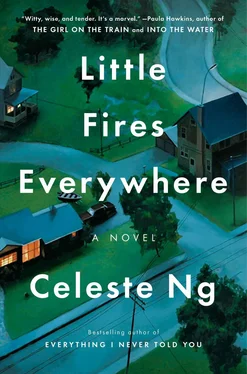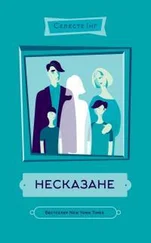“Does May Ling have any dolls?” Ed Lim asked.
“Of course. Too many.” Mrs. McCullough giggled. “She loves them. Just like every little girl. We buy her dolls, and my sisters buy her dolls, and our friends buy her dolls—” She giggled again, and Mr. Richardson’s jaw tensed. “She must have a dozen or more.”
“And what do they look like, these dolls?” Ed Lim persisted.
“What do they look like?” Mrs. McCullough’s brow crinkled. “They’re—they’re dolls. Some are babies, and some are little girls—” It was clear she didn’t understand the question. “Some of them take bottles, and some of them, you can change their dresses, and one of them closes her eyes when you lay her down, and most of them, you can style their hair—”
“And what color hair do they have?”
Mrs. McCullough thought for a moment. “Well—blond, most of them. One has brown hair. Maybe two.”
“How about the doll that closes her eyes? What color are her eyes?”
“Blue.” Mrs. McCullough crossed her legs, then uncrossed them again. “But that doesn’t mean anything. You look at the toy aisle—most dolls are blond with blue eyes. I mean, that’s just the default.”
“The default,” Ed Lim repeated, and Mrs. McCullough had the feeling of being caught out, though she wasn’t sure why.
“It’s not anything racist,” she insisted. “They just want to make a generic little girl. You know, one that will appeal to everyone.”
“But it doesn’t look like everyone, does it? It doesn’t look like May Ling.” Ed Lim stood up, suddenly towering over the courtroom. “Does May Ling have any Asian dolls—that is, any dolls that look like her?”
“No—but when she gets older, and she’s ready, we can buy her a Chinese Barbie.”
“Have you ever seen a Chinese Barbie?” Ed Lim asked.
Mrs. McCullough flushed. “Well—I’ve never gone looking for one. Yet. But there must be one.”
“There isn’t one. Mattel doesn’t make one.” Ed Lim’s daughter, Monique, was a junior now, but as she’d grown up, he and his wife had noticed with dismay that there were no dolls that looked like her. At ten, Monique had begun poring over a mail-order doll catalog as if it were a book—expensive dolls, with names and stories and historical outfits, absurdly detailed and even more absurdly expensive. “Jenny Cohen has this one,” she’d told them, her finger tracing the outline of a blond doll that did indeed resemble Jenny Cohen: sweet faced with heavy bangs, slightly stocky. “And they just made a new one with red hair. Her mom’s getting it for her sister Sarah for Hanukkah.” Sarah Cohen had flaming red hair, the color of a penny in the summer sun. But there was no doll with black hair, let alone a face that looked anything like Monique’s. Ed Lim had gone to four different toy stores searching for a Chinese doll; he would have bought it for his daughter, whatever the price, but no such thing existed.
He’d gone so far as to write to Mattel, asking them if there was a Chinese Barbie doll, and they’d replied that yes, they offered “Oriental Barbie” and sent him a pamphlet. He had looked at that pamphlet for a long time, at the Barbie’s strange mishmash of a costume, all red and gold satin and like nothing he’d ever seen on a Chinese or Japanese or Korean woman, at her waist-length black hair and slanted eyes. I am from Hong Kong, the pamphlet ran. It is in the Orient, or Far East. Throughout the Orient, people shop at outdoor marketplaces where goods such as fish, vegetables, silk, and spices are openly displayed. The year before, he and his wife and Monique had gone on a trip to Hong Kong, which struck him, mostly, as a pincushion of gleaming skyscrapers. In a giant, glassed-in shopping mall, he’d bought a dove-gray cashmere sweater that he wore under his suit jacket on chilly days. Come visit the Orient. I know you will find it exotic and interesting.
In the end, he’d thrown the pamphlet away. He’d heard, from friends with younger children, that the expensive doll line now had one Asian doll for sale—and a few black ones, too—but he’d never seen it. Monique was seventeen now, and had long outgrown dolls.
Now, back in the courtroom, Ed Lim paced a few steps. “How about books? What kind of books do you read with May Ling?”
“Well.” Mrs. McCullough began to think. “We read her a lot of classics. Goodnight Moon, of course. And Pat the Bunny —she loves that. Madeline. Eloise. Blueberries for Sal. I’ve saved all my favorites from when I was a child, and it’s very special to get to share them with Mirabelle.”
“Do you have any books that feature Chinese characters?”
Mrs. McCullough was ready for this one. “Yes, in fact, we do. We have The Five Chinese Brothers —it’s a beautiful retelling of a famous Chinese folktale.”
“I know that book.” Ed Lim smiled again, and Mr. Richardson’s shoulders grew tight. Whenever Ed Lim smiled, he was learning, you had to watch out. You just can’t tell what he’s really thinking, Mr. Richardson thought, and then, instantly chagrined, What a terrible thing to think. He flushed. “What do those five Chinese brothers in the book look like?” Ed Lim was asking.
“They’re—they’re drawings. They all look alike—I mean, a lot like each other, they’re brothers, that’s part of the story, no one can tell them apart—” Mrs. McCullough fumbled.
“They have pigtails, don’t they? And little coolie hats? Slanty eyes?” Ed Lim didn’t wait for Mrs. McCullough to respond. His daughter had seen this book in the school library in second grade and returned home deeply troubled. Daddy, do my eyes look like that? “Not exactly the image of Chinese people I’d want May Ling to have in 1998. What about you?”
“It’s a very old story,” Mrs. McCullough insisted. “They’re wearing traditional costume.”
“How about other books, Mrs. McCullough? Any other books with Chinese characters?”
Mrs. McCullough bit her lip. “I haven’t really looked for them,” she admitted. “I hadn’t thought about it.”
“I can save you some time,” said Ed Lim. “There really aren’t very many. So May Ling has no dolls that look like her, and no books with pictures of people that look like her.” Ed Lim paced a few more steps. Nearly two decades later, others would raise this question, would talk about books as mirrors and windows, and Ed Lim, tired by then, would find himself as frustrated as he was grateful. We’ve always known, he would think; what took you so long?
Now, in the courtroom, Ed Lim stopped in front of Mrs. McCullough’s chair. “You and your husband don’t speak Chinese or know much about Chinese culture or history. You haven’t, by your own testimony, even thought about that entire aspect of May Ling’s identity. Isn’t it fair to say that if May Ling stays with you and Mr. McCullough, she will effectively be divorced from her birth culture?”
At this point, Mrs. McCullough burst into tears. In those early weeks she had fed Mirabelle every four hours, held her every time she cried, and watched her grow until her heels stretched her newborn rompers almost to the breaking point. It was she who had checked Mirabelle’s weight regularly, who steamed peas and sweet potatoes and fresh spinach and pureed them and fed them to Mirabelle in doll-sized spoonfuls. When Mirabelle spiked a fever, it was she who spread a cold washcloth on her forehead, who pressed her lips to that little brow to test the heat. And when an ear infection turned out to be the culprit, it was she who fed antibiotic syrup drop by drop into Mirabelle’s small pink mouth and let her lap it up like a kitten. She could not, she had thought as she bent to kiss the baby’s flushed cheek, have loved this child more if it had come from her own flesh. All night—because feverish Mirabelle would not sleep except in motion—she cradled Mirabelle in her arms and paced the length of the room. By morning she had walked nearly four miles. It was she who, after breakfast, before bath time, and at bed, nuzzled Mirabelle’s soft belly until the baby gurgled with laughter. She was the one who had caught Mirabelle in her arms as she stumbled to stand upright; she was the one to whom Mirabelle stretched out her own arms when she was in pain, or afraid, or lonely. She would know Mirabelle in pitch dark by one cry of her voice—no, one touch of her hand. No, one breath of her smell.
Читать дальше












